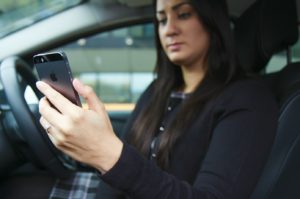Landmark High Court judgment could see mobile phone law change
Mobile phone laws could be rewritten after a driver won a High Court appeal yesterday (31 July 2019) over a previous conviction for using his phone.

The High Court judgement could be applied to a whole host of scenarios, from using certain apps to skipping music tracks on iTunes.
Current legislation governing mobiles and motoring stipulates that an offence is committed if you’re using your phone for ‘interactive telecommunication’ while at the wheel. As this was written back in 2003 prior to smartphones, the law covers sending or receiving phone calls or texts, but lawyers have successfully argued that using your phone’s camera while driving is not covered by the law.
The test case centres around builder Ramsey Barreto who was convicted of driving while using a hand-held phone after police spotted him filming while driving past a crash in Ruislip, north London. His conviction was later overturned at Isleworth Crown Court but the Director of Public Prosecutions challenged the decision in the High Court. Now the High Court has sided with Barreto in a decision that Baretto’s lawyers say could see a flood of ‘using mobile phone while driving’ cases overturned.
Barreto’s solicitor Emma Patterson from Patterson Law said: “We have been arguing for many years that the legislation in relation to the offence of using a handheld mobile phone whilst driving a motor vehicle has failed to keep pace with the evolution of smartphones.
“The increasing multi-functionality of smartphones was, in fact, making a mockery of the law.
“We ended up with a situation where you could hold a Casio calculator performing mathematical calculations whilst driving and you would not be committing a mobile phone offence, whereas doing exactly the same thing on the calculator app on a smartphone, according to the way the police or Crown Prosecution Service were applying the law, meant you would automatically be committing an offence warranting six points and a hefty fine.”
Patterson added that this is not a loophole argument but simply the correct application and understanding of the law as it currently stands.
However, she warned that drivers who use their phones at the wheel may still be committing an offence of driving without due care and attention, or dangerous driving, which they could be charged with.
She added: “We have always said that it is dangerous to interact with any type of device whilst driving a motor vehicle on a road and it was always open to the police or prosecution to pursue an allegation of driving without due care and attention or perhaps even dangerous driving.
“That was never the issue. The issue was that the law as it stood created anomalies and confusion.”
Commenting on the High Court decision, UK motoring expert Francis Noakes, of the Get Licensed Driving School, urged lawmakers to revisit the legislation as a ‘matter of urgency’.
He said: “What this test case shows is that, as it stands, prosecutions are far from straightforward and an offence is difficult to prove.
“When it comes to road safety, we simply can’t allow for any uncertainty to exist.”
The landmark High Court decision comes as new research for Kwik Fit reveals 2.7 million drivers have had a collision or veered off the road in the last two years because they were distracted by their mobile phone. Of these drivers, just over one million had collided with another car while their attention was diverted from the road. A further 4% of motorists, some 1.8 million drivers, have been involved in a collision in the last two years because another driver was distracted by their phone.
And while texting was a key distraction, with a quarter of motorists (24%) admitting to reading texts when driving while one in five (20%) confessed to sending them, the most common reasons people give for using their phone at some point while driving are to use the GPS or satnav (40%) as well as to take a call on speaker (44%) and make a call on speaker (41%).

















